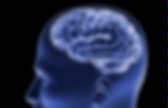

You Have the Power to Physically Reshape Your Brain. Doctors Say Your Word Choice Can Hugely Change Your Brain. Be careful because the next word you say could determine how your day is, or the rest of your life might pan out.
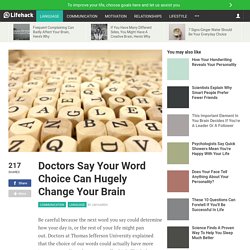
Doctors at Thomas Jefferson University explained that the choice of our words could actually have more impact on our lives than we actually think. Think the words of “I can’t”, “I won’t” or “it’s tough”, are harmless? Use them long enough and it will literally change your brain and here’s why. Positive words strengthens frontal lobe Dr. The 10 Fundamentals Of Rewiring Your Brain. Neuroplasticity has become a buzzword in psychology and scientific circles, as well as outside of them, promising that you can “re-wire” your brain to improve everything from health and mental wellbeing to quality of life.
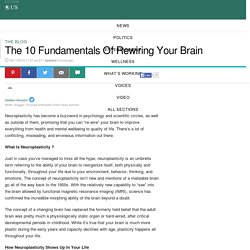
There’s a lot of conflicting, misleading, and erroneous information out there. What Is Neuroplasticity ? Just in case you’ve managed to miss all the hype, neuroplasticity is an umbrella term referring to the ability of your brain to reorganize itself, both physically and functionally, throughout your life due to your environment, behavior, thinking, and emotions. There’s a way to train our brains to cope with stress that changes chemistry “as much as any antidepressant” — Quartz. Stress is often perceived as the villain of contemporary culture: the nagging tension that keeps us chained to our desks during the day, awake all night, and makes us dangerously unhealthy.

But Ian Robertson, a cognitive neuroscientist at Trinity College Dublin and author of the upcoming book ‘The Stress Test: How Pressure Can Make You Stronger and Sharper,” says that, while too much stress can be debilitating, a moderate amount is extremely good for the mind. He explains that stress causes the brain to secrete a chemical called noradrenaline. The brain doesn’t perform at its best with too little or too much of this chemical. But “there’s a sweet spot in the middle where if you have just the right amount, the goldilocks zone of noradrenaline, that acts like the best brain-tuner.” How GPS Came to Be—and How It May Be Altering Our Brains. In Pinpoint: How GPS Is Changing Technology, Culture, and Our Minds, Greg Milner tells two stories.

One’s about how the Global Positioning System became one of the 21st century’s most important technologies. The other’s about how it may be stunting the brains of the ingenious species that created it. We use GPS today to guide airplanes, ships, and tractors. It keeps tabs on sex offenders and helps find oil deposits. “GPS surveys land, and builds bridges and tunnels,” Milner writes. Mental abilities are shaped by individual differences in the brain. Everyone has a different mixture of personality traits: some are outgoing, some are tough and some are anxious.
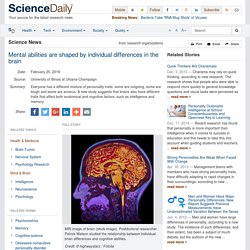
A new study suggests that brains also have different traits that affect both anatomical and cognitive factors, such as intelligence and memory. The results are published in the journal NeuroImage. "A major focus of research in cognitive neuroscience is understanding how intelligence is shaped by individual differences in brain structure and function," said study leader Aron K. Barbey, University of Illinois neuroscience professor and Beckman Institute for Advanced Science and Technology affiliate.
For years, cognitive neuroscientists have tried to find relationships between specific areas of the brain and mental processes such as general intelligence or memory. Future - Why ‘bowl food’ might be tricking your brain. “I’ve eaten the same meal on a plate,” New Yorker Lily Kunin told the NY Post recently.
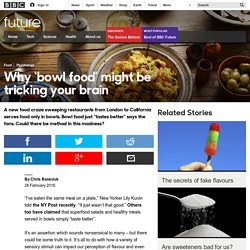
“It just wasn’t that good.” Others too have claimed that superfood salads and healthy meals served in bowls simply “taste better”. It’s an assertion which sounds nonsensical to many – but there could be some truth to it. Your Brain Is Hardwired to Snap. By Simon Worrall We’ve all been there: Some jerk cuts you off on the highway.

You lean on the horn, scream abuse. You want to get out the car and kick the @#$% out of the bozo’s SUV. Road rage is just one example of what neurobiologist Douglas Fields calls “snapping.” From domestic violence to mass shootings, the news is full of stories of seemingly “normal” people suddenly going berserk. How Dopamine is Transported Within the Brain – Neuroscience News. Researchers at University of Florida Health have discovered the mechanics of how dopamine transports into and out of brain cells, a finding that could someday lead to more effective treatment of drug addictions and neurological disorders such as Parkinson’s disease.
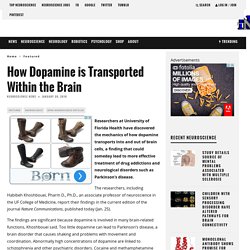
The researchers, including Habibeh Khoshbouei, Pharm D., Ph.D., an associate professor of neuroscience in the UF College of Medicine, report their findings in the current edition of the journal Nature Communications, published today (Jan. 25). The findings are significant because dopamine is involved in many brain-related functions, Khoshbouei said. Why It’s So Hard to Break Habits – Neuroscience News. Getting hooked changes the brain, scientists find.
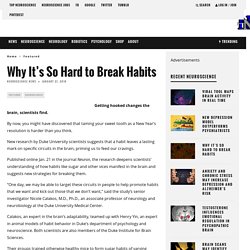
By now, you might have discovered that taming your sweet tooth as a New Year’s resolution is harder than you think. New research by Duke University scientists suggests that a habit leaves a lasting mark on specific circuits in the brain, priming us to feed our cravings. Testosterone Influences Emotional Regulation in Psychopathic Brain – Neuroscience News. Brain research has demonstrated that psychopaths exhibit reduced control over their emotional actions.
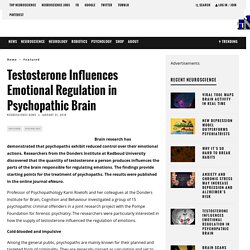
Researchers from the Donders Institute at Radboud University discovered that the quantity of testosterone a person produces influences the parts of the brain responsible for regulating emotions. The findings provide starting points for the treatment of psychopaths. The results were published in the online journal eNeuro. Professor of Psychopathology Karin Roelofs and her colleagues at the Donders Institute for Brain, Cognition and Behaviour investigated a group of 15 psychopathic criminal offenders in a joint research project with the Pompe Foundation for forensic psychiatry.
We’re hard-wired to want vengeance: “Those are the brain systems that are old — they’re the ones we share with dogs and rats and deer” Last week’s Paris terrorist attacks, like most other large-scale crimes, has seen the original violence followed by a period in which the perpetrators are tracked down and killed, often one by one. Pick up a newspaper or glance at the Internet, and someone else has been found and killed. We see it in death penalty cases; we saw it on the hunting of Osama Bin Laden after the September 11 attacks.
The latest example involves a raid that killed Abdelhamid Abaaoud, the suspected leader of the attacks. Jailing someone who commits a crime – so he or she won’t break the law again — makes rational sense. But vengeance is a different kind of process, deeply rooted in our emotional system. Human brains do not reach 'ultimate state of maturity' until 25, says minister. "There is a considerably held view that it is not until the age of 25 that the adult brain reaches its ultimate state of maturity. " The Minister condemned the remarks, saying: "I resent the noble Lord's suggestion. We are engaging in an argument about whether to lower the voting age. Seeking comparisons with the Ku Klux Klan is entirely inappropriate and I reject it. " Battle of the ballot box - but who will be best for business?
Yin and Yang of Serotonin Neurons in Mood Regulation. More nuanced view of brainstem neurons could lead to better drugs for depression and anxiety. Low levels of serotonin in the brain are known to play a role in depression and anxiety, and it is customary to treat these disorders with medications that increase the amount of this neurotransmitter. However, a new study carried out by researchers at Columbia University Medical Center (CUMC) suggests that this approach may be too simple.
It appears that neighboring serotonin-producing brainstem regions exert different and sometimes opposing effects on behavior. Why Some Remember Dreams, Others Don't. People who tend to remember their dreams also respond more strongly than others to hearing their name when they're awake, new research suggests. Everyone dreams during sleep, but not everyone recalls the mental escapade the next day, and scientists aren't sure why some people remember more than others.
To find out, researchers used electroencephalography to record the electrical activity in the brains of 36 people while the participants listened to background tunes, and occasionally heard their own first name. The brain measurements were taken during wakefulness and sleep. Half of the participants were called high recallers, because they reported remembering their dreams almost every day, whereas the other half, low recallers, said they only remembered their dreams once or twice a month.
When asleep, both groups showed similar changes in brain activity in response to hearing their names, which were played quietly enough not to wake them. Who remembers their dreams. Why Coloring Is Good for the Mind, Body, and Soul Trendiness is rarely next to Godliness. Sleep On It: Your Brain Never Takes a Night Off For something as natural to humans as breathing, sleep suffers from a bit of a reputational crisis.
Somewhere along the line, sleep became the adult equivalent of eating your vegetables, something you have to do to get to something else you'd rather be doing, like eating dessert. What's worse, Americans tend to wear their lack of sleep like a badge of honor, a testament to their dedication and, presumably, their productivity. Extra Brain Cells Make Males Remember Sex. Diet's effects on the brain greater than previously thought - All In The Mind. Australia is fatter than ever before. Is This Smart Drug The Most Powerful Brain Enhancer in the World?
How Art Changes Consciousness. This Is Your Brain on Love. Her name is ‘Sparkle.’ She operates a drone. Training the brain to push the body beyond its limits. Men Finally Have an Excuse for Constantly Thinking About Sex, According to Science. You know that old myth about how men think about sex every seven seconds? It's truer than you think; in fact, new research suggests that men's brains are wired to seek out sex at the expense of food.
That's the conclusion researchers at the University College of London reached in a new study published this week in Nature, which concluded that the brains of human males likely possess a few extra cells ("mystery neurons," as some researchers call them, or MCMs for "mystery cells of the male") that power the constant desire for sex. There's an important caveat, obviously. Get Smarter with the 5 Best Brain Boosting Supplements. If you are looking for supplements to help improve your memory, mental clarity, focus and concentration, and to combat the hazards of age-related cognitive decline (ARCD), check out these 5 powerful brain boosters! Omega-3. Intelligent people's brains wired differently to those with fewer intellectual abilities, says study. Research Finds Music Training Increases Brain Power And Language Skills.
Forget Brain Workouts—Chanting Mantras Takes Half the Time and Is More Effective - Promising Practices - Management. Brainy tips to boost productivity. Why teens love texting. Take A Look At What Poverty Does to Your Brain. How Sleep Position May Affect the Brain 47 Hacks People With ADD/ADHD Use To Stay On Track. Being in Nature Changes the Brain. Take A Look At What Poverty Does to Your Brain. How Sleep Position May Affect the Brain Your stressed-out brain is breaking your diet. 5 Terrible Things Science Says You Do to Your Mind Everyday. 3 Reasons to Journal Your Thoughts. Here's More Evidence That Coffee Is Good For Your Brain.
Self-control improves your prospects. But it may harm your health. Study finds association between teen sleep patterns and alcohol or marijuana use. Musical tastes offer a window into how you think. This Is Your Brain on Exercise. What does rosemary do to your brain? Hookup or commitment? Study finds relationship intentions influence women's memory of men. Movement in ADHD may help children think, perform better in school. A Corkscrew vs A Left Turn. Porsche. Uncommon. New Study Finds Rats May Plan for the Future While Dreaming. 7 Ways To Truly Be In Control Of Your Own Mind. Addicted to selfies? Why you could be a psychopath. What’s The Difference Between A Sociopath And A Psychopath? (Not Much, But One Might Kill You) Build a Stress-Resilient Brain: Findings and Strategies. New Study Links Delay of Gratification to How Brain Structures Are Connected. Environmental factors account for the link between cannabis and psychosis. The information our brains forget so they don't become too 'full'
This Graphic Explains How Lack of Sleep Can Negatively Affect Your Brain. Memory vitamins to boost your brain and memory. Facebook addiction - and how to tackle it. Newly discovered vessels beneath skull could link brain and immune system. Study Uncovers Link Between Blood Type And Risk Of Cognitive Decline. Smell, evolution and the sex brain: why we're monogamous and use perfume. Parasite in cats linked to learning difficulties in children. Researchers Find Missing Link Between the Brain and Immune System.
Poor sleep linked to toxic buildup of Alzheimer’s protein, memory loss. How to Build a Bolder Brain With Age Spark of Genius: Boosting the Brain with tDCS and TMS. Provigil: “Viagra for the brain?”